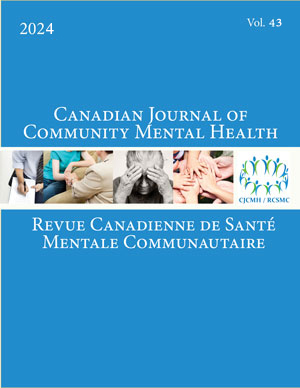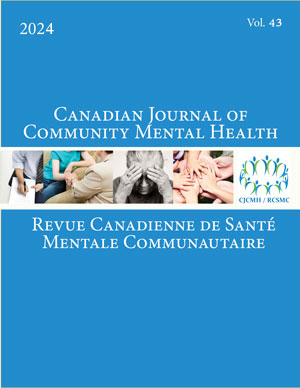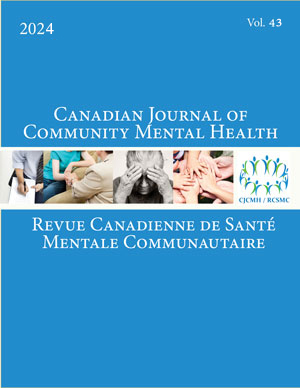Volume 38 • Number 3 • November 2019
Articles
OPEN ACCESS
Les Inuit du Nunavik, suite aux changements sociaux considérables auxquels ils font face, vivent des difficultés importantes de santé mentale. L’objectif de cette recherche est d’explorer la vision qu’ont les jeunes Inuit de la santé mentale et de vérifier si les services offerts par les organismes locaux comblent leurs besoins. Pour ce faire, 5 jeunes adultes de 18 à 25 ans ont été recrutés. Par le biais de Photovoice, ils ont illustré leur définition de la santé mentale. Neuf entrevues semi-structurées ont été menées auprès d’intervenantes et d’intervenants clés oeuvrant au sein d’organismes du milieu. Par une analyse thématique, utilisant les théories de Maslow et de Bronfenbrenner, la vision des jeunes a été analysée ainsi que le rôle de chaque organisme. Une compréhension de leur vision de la santé mentale en ressort et celle-ci est essentielle afin que les ressources mises à leur disposition puissent fournir une réponse culturellement appropriée. Ainsi, il sera possible, en partenariat avec la communauté, de déterminer les actions à prioriser à l’avenir.
OPEN ACCESS
This study tested the association between tenancy status in public housing and demographic, geographic, socioeconomic, health status, and health service use characteristics using linked population-based administrative data from Manitoba, Canada. The data were analyzed using multivariable Cox proportional hazards regression. Age, residence location, receipt of income assistance, residential mobility, being diagnosed with a substance abuse disorder, and continuity of care were significantly associated with moving. Voluntary moves were only associated with socioeconomic characteristics, while eviction was also associated with health status and health service use characteristics. Public housing authorities can benefit from this profile of resident characteristics in order to identify who may need supports to have a successful tenancy.
OPEN ACCESS
It is common for individuals with fetal alcohol spectrum disorders (FASD) to require support for mental health and addictions but there are challenges associated with receiving appropriate care in Canada. This qualitative investigation of the barriers and enablers to the development of a clinical pathway in mental health and addictions included focus groups of individuals with FASD, caregivers, family members, and clinicians. Data was thematically coded and the following themes are described: the absence of support outside of crisis, the struggle of navigating separated services, the common experience of service providers who lack understanding of FASD, and the benefits of FASD-informed care.
OPEN ACCESS
The current study evaluated the effectiveness of a novel three-hour Guided Mindfulness Program on participants’ management of depression, anxiety and stress. The intervention included an educational component emphasizing the psychological value of mindfulness practice combined with a practical training component in mindfulness techniques. The Depression Anxiety Stress Scale was administered at three points in time before and after participation in the program. Additionally, semi-structured interviews were conducted to explore perceived quality of life, happiness, and stress 4 to 8 weeks following the program. All participants reported improvements in overall well-being and reported significant decreases in negative affect when comparing pre-program scores (baseline) to follow-up scores. Notably, qualitative interview results indicated that participants attributed most positive post-program results to informal mindfulness practice.
OPEN ACCESS
Mobile crisis services for children and youth have been available in Ontario since 2000 yet little descriptive information about such services exists. In this evaluation, crisis workers gathered demographic information and details about the nature of the crisis from youth ages 12 to 17 and parents/guardians of children from birth to 17 years of age during a crisis intervention. Approximately two weeks post-intervention, participants responded to a quantitative questionnaire administered via telephone that measured levels of upset, awareness, coping, and confidence. This paper adds to the literature by describing the types of calls received, characteristics of service users, and outcomes for youth and families. The findings suggest this type of service may be valuable in serving youth, and that more rigorous examination is required by mobile crisis services for youth to demonstrate the true contribution.
OPEN ACCESS
Social support is closely connected to mental health and well-being as well as experiences of housing vulnerability. This study explored differences between homeless and vulnerably housed women in their experiences of social support. Forty-nine homeless and 43 vulnerably housed women completed 3 measures to assess their social networks, social support networks, and global social support. Vulnerably housed women reported fewer social support network members than homeless women. Social support network size was found to be a predictor of global social support score. These findings suggest that housing status impacts social support in homeless and vulnerably housed women, which may have implications for their well-being.
OPEN ACCESS
Cet article explore l’impact des structures et processus de travail des équipes sur les personnes utilisatrices dans trois réseaux de services en santé mentale du Québec dans un contexte de réforme. Des coordonnateurs (N = 41), professionnels de soins (N = 311) et des personnes utilisatrices (N = 327) ont été sondés. Les effets sur les personnes utilisatrices dans le troisième réseau, semi-urbain, sont similaires à ceux du premier réseau, urbain et mieux nanti. L’autonomie d’équipe, la participation décisionnelle et des interactions avec les partenaires du réseau peuvent contribuer à améliorer la continuité des services, la qualité de vie et le rétablissement des personnes utilisatrices malgré un financement moindre.
OPEN ACCESS
Environ un couple canadien sur six est confronté à l’infertilité. Le stress découlant du diagnostic et des traitements de fertilité peut affecter le bien-être psychologique des hommes comme des femmes. La présente étude examine l’expérience psychologique des hommes et des femmes québécois. L’analyse thématique des entrevues semi-structurées de huit femmes et six hommes a permis de dégager les éléments plus spécifiques à la femme, à l’homme et les éléments communs aux deux. Comprendre l’expérience psychologique des hommes et femmes en traitement de fertilité permettra d’adapter les interventions des professionnels de la santé selon le genre pour soutenir adéquatement chaque partenaire.










